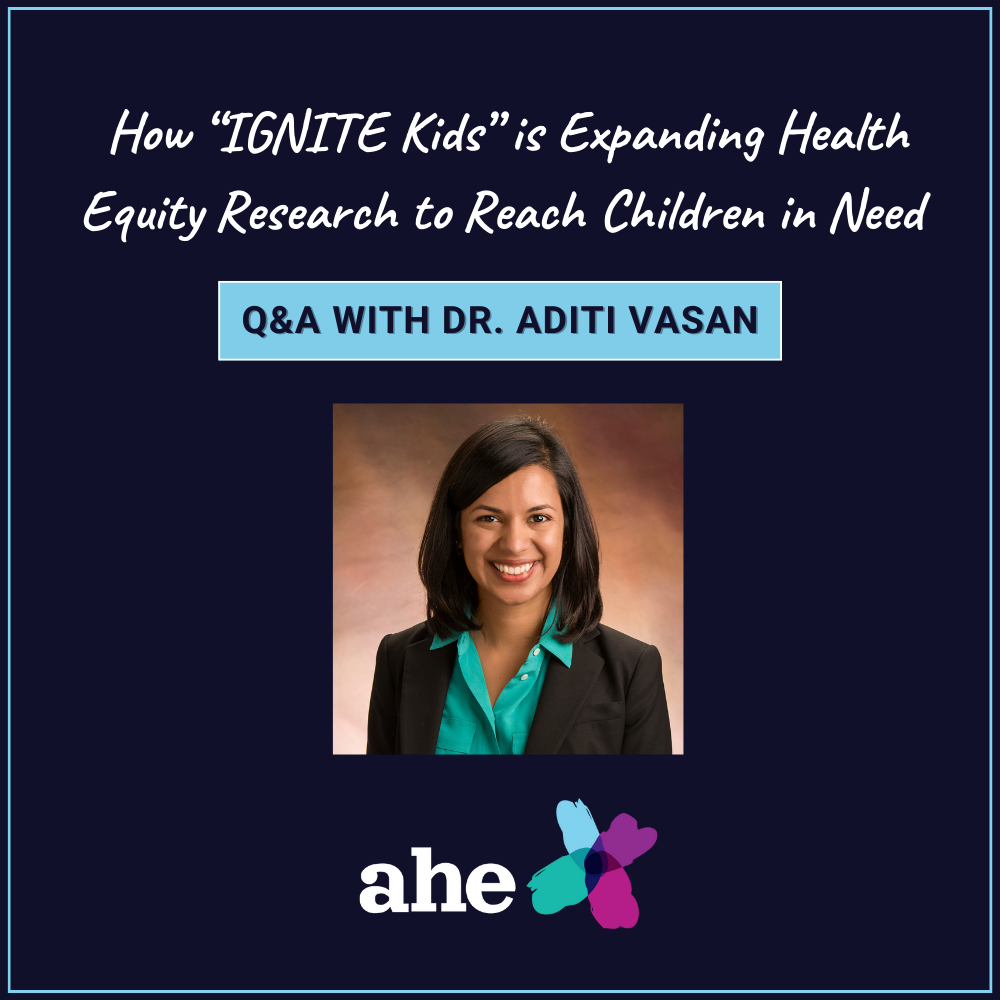How “IGNITE Kids” is Expanding Health Equity Research to Reach Children in Need
Black children in the United States fare worse across nearly every health indicator, a disadvantage that starts before birth and results in stark racial gaps in child health and well-being — these disparities persist into adulthood. In Philadelphia, Black adults have higher rates of premature cardiovascular disease, diabetes, and other health conditions, and face higher rates of community violence, poverty, as well as racism and discrimination in healthcare settings.
Accelerate Health Equity (AHE) strives to convene and support initiatives that help to bolster health equity and produce positive changes in health outcomes in Philadelphia. With support from Independence Blue Cross, AmeriHealth Caritas, and AHE, the IGNITE research team at the University of Pennsylvania — led by Dr. Gina South and Dr. Atheendar Venkataramani — was awarded $700,000 over two years to expand their ongoing research study to include 480 school-age children, with plans to contribute additional funding up to $1.5 million total. This expansion, known as the IGNITE Kids study in partnership with Children’s Hospital of Philadelphia, leverages and builds on the resources and infrastructure of the existing IGNITE study to significantly advance the science around child health equity.
Our team sat down with Dr. Aditi Vasan, lead investigator on IGNITE Kids, to learn more about the study and how economic and environmental interventions can help children across the city achieve better health outcomes.
Tell us a little bit about the IGNITE Kids study and how it will impact health equity in Philadelphia.
The IGNITE Kids study aims to improve health equity in Philadelphia by addressing both environmental and economic factors that influence child health. Our team is working in 60 neighborhoods or “clusters” across West and North Philadelphia, recruiting about four to eight children in each cluster. In order to study the impact that these environmental and economic interventions have, half of these clusters have been randomly selected to receive the IGNITE Kids intervention.
At the neighborhood level, study participants will receive environmental interventions — trash pickup, vacant lot greening, and tree planting — in addition to a series of economic interventions at the household level, which include connection to government benefits, tax preparation services, financial counseling, and small micro-grants. Our team of researchers will study child health and well-being outcomes across intervention and control clusters to see how our interventions have impacted children’s overall health.
We hypothesize that by improving the neighborhoods where children live and increasing the economic resources available to their families, we will be able to improve parent and child health and well-being, and ultimately promote more equitable health outcomes, for children in Philadelphia.
How did the IGNITE Kids study come to be? What was the initial need?
We know that Black children in Philadelphia and across the United States often have worse health outcomes, and the fundamental cause of these racial health disparities is structural racism. Structural racism operates via interconnected, mutually reinforcing social and economic pathways that function at multiple levels. Many interventions that seek to reduce racial health gaps are focused on addressing single social determinants of health or changing specific health-related behaviors, which limits their effectiveness.
Our team designed the IGNITE intervention to address the multitude of layered mechanisms that generate persistent health disadvantages for Black Americans. The original IGNITE trial was funded by the National Institutes of Health (NIH) and focused on adult health outcomes, but our team was interested in expanding our reach to look at the effects of this intervention on children’s health. With support from Independence Blue Cross, AmeriHealth Caritas, and Accelerate Health Equity (AHE), we are excited to bring the IGNITE Kids intervention to children and families across the city and to evaluate the effects of this unique suite of environmental and economic interventions on child health.
What stage is the study currently in, and what can we expect to see next?
We are currently in the recruitment phase of IGNITE Kids. So far, we have enrolled about 120 households that include at least one child, with more than 200 eligible children in total. We plan to continue recruitment through the late summer and early fall of 2023 and then begin providing our suite of economic and environmental interventions to these households. We expect to begin our survey of child health outcomes in the fall of 2024, two years after the first IGNITE participants were enrolled.
Aditi Vasan, MD, MSHP, is an attending physician with the Division of General Pediatrics at Children's Hospital of Philadelphia.

